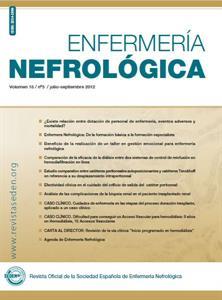Contenido del artículo principal
Resumen
Objetivo: Identifi car las creencias y representaciones sobre la insuficiencia renal crónica (IRC) en pacientes, población general y expertos.
Metodología:
Estudio descriptivo transversal que analiza una muestra de 120 participantes seleccionados por muestreo no probabilístico por cuotas. Se crearon cinco grupos de estudio en función de su nivel de interacción con la enfermedad. La herramienta utilizada fue el Cuestionario de Creencias Sobre la Enfermedad.
Resultados:
Identidad, Controlabilidad, Mutabilidad, Responsabilidad Personal y Azar no presentan diferencias significativas entre los grupos estudiados. El factor Causas muestra diferencias estadísticamente significativas entre el grupo de pacientes con universitarios de ciencias de la salud y expertos (p<0,001)
y entre otros universitarios con universitarios ciencias de la salud y expertos (p<0.001). El factor Incapacidad muestra diferencias signifi cativas entre pacientes, universitarios y población general
(p<0,001) y entre expertos con otros universitarios y población general (p<0,001). Los pacientes ofrecen un menor número de síntomas asociados tanto a la IRC como a la hemodiálisis (HD). Y en cuanto a las causas, las de origen biológico y conductuales
son las más consideradas por todos los grupos. Solo
el grupo de pacientes en HD considera el azar factor causal de la enfermedad.
Conclusiones:
En oposición al modelo científi co, pacientes y población general comparten la idea de que la IRC es curable, depende en gran medida del azar y de hábitos de conducta y es menos grave de lo que opinan expertos. La experiencia con la enfermedad aporta más información (no necesariamente conocimiento) que es recordada en función de la utilidad para lograr un mayor bienestar o una mejora de los cuidados.
Metodología:
Estudio descriptivo transversal que analiza una muestra de 120 participantes seleccionados por muestreo no probabilístico por cuotas. Se crearon cinco grupos de estudio en función de su nivel de interacción con la enfermedad. La herramienta utilizada fue el Cuestionario de Creencias Sobre la Enfermedad.
Resultados:
Identidad, Controlabilidad, Mutabilidad, Responsabilidad Personal y Azar no presentan diferencias significativas entre los grupos estudiados. El factor Causas muestra diferencias estadísticamente significativas entre el grupo de pacientes con universitarios de ciencias de la salud y expertos (p<0,001)
y entre otros universitarios con universitarios ciencias de la salud y expertos (p<0.001). El factor Incapacidad muestra diferencias signifi cativas entre pacientes, universitarios y población general
(p<0,001) y entre expertos con otros universitarios y población general (p<0,001). Los pacientes ofrecen un menor número de síntomas asociados tanto a la IRC como a la hemodiálisis (HD). Y en cuanto a las causas, las de origen biológico y conductuales
son las más consideradas por todos los grupos. Solo
el grupo de pacientes en HD considera el azar factor causal de la enfermedad.
Conclusiones:
En oposición al modelo científi co, pacientes y población general comparten la idea de que la IRC es curable, depende en gran medida del azar y de hábitos de conducta y es menos grave de lo que opinan expertos. La experiencia con la enfermedad aporta más información (no necesariamente conocimiento) que es recordada en función de la utilidad para lograr un mayor bienestar o una mejora de los cuidados.
Palabras clave
Creencias sobre la enfermedad; Insuficiencia renal crónica; Hemodiálisis; Percepciones de la enfermedad en expertos y novatos
Detalles del artículo
Licencia
Aviso de derechos de autor/a
© Los autores ceden de forma no exclusiva los derechos de explotación de los trabajos publicados y consiente en que su uso y distribución se realice con la Licencia Creative Commons Atribución - No comercial 4.0 Internacional (CC BY-NC 4.0). Puede consultar desde aquí la versión informativa y el texto legal de la licencia. Esta circunstancia ha de hacerse constar expresamente de esta forma cuando sea necesario.
Cómo citar
1.
Vélez Vélez E. Creencias sobre la insuficiencia renal crónica entre expertos y profanos. Enferm Nefrol [Internet]. 2013 [consultado 13 Nov 2025];16(3):[aprox. 11 p.]. Disponible en: https://www.enfermerianefrologica.com/revista/article/view/4195




